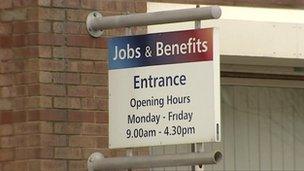McCausland presses case for Welfare Reform Bill in NI
- Published

A range of benefits, such as Jobseeker's allowance, will be affected if the changes are voted through
Minister for Social Development Nelson McCausland has pressed the case for pushing ahead with the biggest shake-up in benefits for decades.
Speaking before an Assembly debate on the controversial Welfare Reform Bill, he claimed a decision to delay would impact on the most vulnerable.
"We would endanger 1,500 jobs in Northern Ireland and it would cost us £200m," he said.
The new bill will affect tens of thousands of households in NI.
"If the bill is delayed, there would be no Social Fund to help them," Mr McCausland said.
"This is the reality that people must face up to."
The Social Fund is a system that offers financial support to help people on low incomes cope with certain life situations, like funeral costs or cold weather payments.
The new bill will include changes to payments such as housing benefit, Jobseeker's allowance and disability living allowance (DLA).
Sinn Fein wants to have the bill deferred to allow more negotiation with the government in Westminster, but other parties, including the DUP, say it must go through or NI risks losing millions of pounds in Treasury funding.
'Unpalatable elements'
Speaking on BBC NI's Good Morning Ulster, Mr McCausland said he was due to meet Welfare Reform Minister Lord Freud next week and negotiations were taking place about Northern Ireland's specific needs.
"We are well on the way to getting the flexibility we need in Northern Ireland," he said.
"There are elements in the bill that are unpalatable, but we are working and negotiating with government to get the flexibilities we need.
"But this legislation needs to be through by 31 March. There is no more slippage time left. It would be irresponsible if people were to attempt it."
However, Sinn Fein MLA Alex Maskey insisted that there was time to change the bill.
"We believe it can be changed if the parties work together and sing off the same hymn sheet," he said.
"We want the bill to be deferred so that we can make it better. We are putting in a reasonable amendment. We are simply saying: 'Here are the concerns we have'."
The Welfare Reform Bill has already been passed by the government in England and Wales.
Sinn Fein has claimed the changes amount to Tory cuts. However, the Stormont Executive has decided to press on with the legislation rather than break with the UK-wide benefits system.
Under the changes six benefits, including housing benefit, would be brought together in a single monthly Universal Credit payment.
The bill would also replace DLA with a personal independence payment.
That would mean claimants would be independently assessed every three years, instead of assessing themselves, as happens at the moment.
Northern Ireland's largest public sector trade union is among those opposed to the legislation.
'Welfare dependency'
The Northern Ireland Public Sector Alliance (Nipsa) has claimed that working families and those looking for work would be worse off if the bill was passed.
Nipsa's deputy general secretary, Alison Millar, said: "At a time when unemployment is rising in Northern Ireland it is not appropriate that the Assembly are debating how to take £500m annually out of the NI economy.
"If this bill is voted through then many more jobs in both the public and private sector will be lost."
Ms Millar added: "Also with unemployment figures rising month on month, more families will be faced with a bleak future with cuts to the welfare benefits at a time when they are needed most."
But speaking last week, Prime Minister David Cameron defended the legislation.
He said his government is "tackling the welfare dependency that has harmed too many parts of our country, including Northern Ireland, for too long".
- Published9 October 2012
- Published5 October 2012
- Published4 October 2012
- Published9 September 2012
- Published17 September 2012
- Published26 April 2012